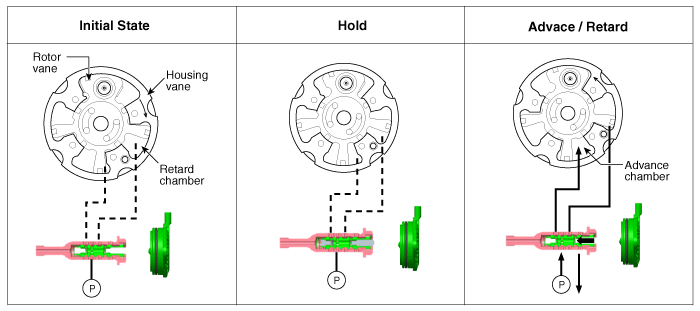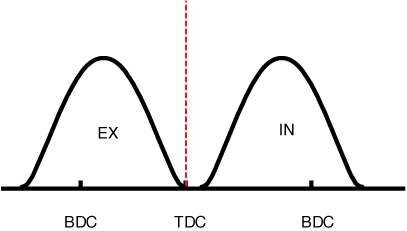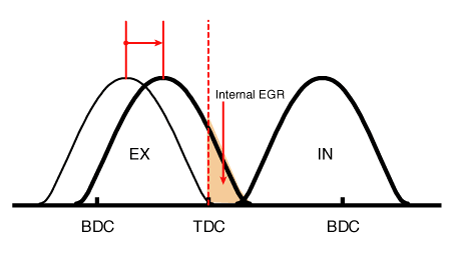Hyundai Ioniq: Exhaust Emission Control System / CVVT (Continuously Variable Valve Timing) System. Description and operation
Hyundai Ioniq (AE) 2017-2025 Service Manual / Engine Electrical System / Exhaust Emission Control System / CVVT (Continuously Variable Valve Timing) System. Description and operation
| Description |
Continuous Variable Valve Timing (CVVT) system advances or retards the valve timing of the intake and exhaust valve in accordance with the ECM control signal which is calculated by the engine speed and load.
By controlling CVVT, the valve over-lap or under-lap occurs, which makes better fuel economy and reduces exhaust gases (NOx, HC) and improves engine performance through reduction of pumping loss, internal EGR effect, improvement of combustion stability, improvement of volumetric efficiency, and increase of expansion work.
This system consist of
| – | the CVVT Oil Control Valve (OCV) which supplies the engine oil to the cam phaser or runs out the engine oil from the cam phaser in accordance with the ECM PWM (Pulse With Modulation) control signal, |
| – | the CVVT Oil Temperature Sensor (OTS) which measures the engine oil temperature, |
| – | and the Cam Phaser which varies the cam phase by using the hydraulic force of the engine oil. |
The engine oil getting out of the CVVT oil control valve varies the cam phase in the direction (Intake Advance/Exhaust Retard) or opposite direction (Intake Retard/Exhaust Advance) of the engine rotation by rotating the rotor connected with the camshaft inside the cam phaser.
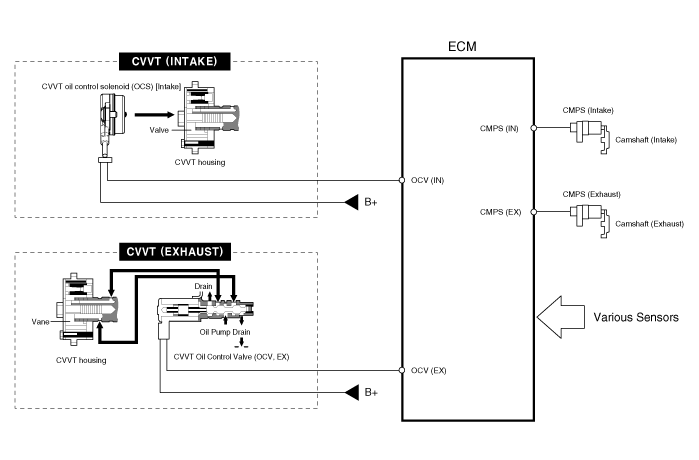
| Operation Principle |
The CVVT has the mechanism rotating the rotor vane with hydraulic force generated by the engine oil supplied to the advance or retard chamber in accordance with the CVVT oil control valve control.
| 1. | Intake CVVT
|
| 2. | Exhaust CVVT
|
[CVVT System Mode]
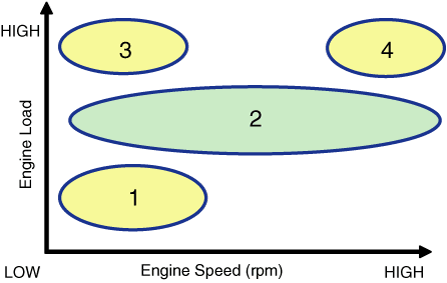
| (1) Low Speed / Low Load | (2) Part Load |
|
|
| (3) Low Speed / High Load | (4) High Speed / High Load |
|
|
| Driving Condition | Exhaust Valve | Intake Valve | ||
| Valve Timing | Effect | Valve Timing | Effect | |
| (1) Low Speed /Low Load | Completely Advance | * Valve Under-lap * Improvement of combustion stability | Completely Retard | * Valve Under-lap * Improvement of combustion stability |
| (2) Part Load | Retard | * Increase of expansion work * Reduction of pumping loss * Reduction of HC | Retard | * Reduction of pumping loss |
| (3) Low Speed /High Load | Retard | * Increase of expansion work | Advance | * Prevention of intake back flow (Improvement of volumetric efficiency) |
| (4) High Speed /High Load | Advance | * Reduction of pumping loss | Retard | * Improvement of volumetric efficiency |
 Catalytic Converter. Description and operation
Catalytic Converter. Description and operation
DescriptionThe catalytic converter of the gasoline engine is a three way catalyst. It oxidizes carbon monoxide and hydrocarbons (HC), and separates oxygen from the oxides of nitrogen (NOx)...
 GPF (Gasoline Particulate Filter). Description and operation
GPF (Gasoline Particulate Filter). Description and operation
DescriptionThe Gasoline Particulate Filter (GPF) system prevents Particulate Matter (PM) from being discharged to the atmosphere and consists of a filter assembly, two Exhaust Gas Temperature Sensors (EGTS)...
Other information:
Hyundai Ioniq (AE) 2017-2025 Owner's Manual: Refill inverter coolant, Stop vehicle and check brakes/ Stop vehicle and check regen. brakes
Refill inverter coolant This message is displayed when the inverter coolant is nearly empty. You should refill the inverter coolant. Stop vehicle and check brakes/ Stop vehicle and check regen. brakes Either message is displayed when a failure occurs in the brake system...
Hyundai Ioniq (AE) 2017-2025 Service Manual: High voltage battery handling guide
High voltage battery system inspection guide • Be sure to read and follow the "General Safety Information and Caution" before doing any work related with the high voltage system. Failure to follow the safety instructions may result in serious electrical injuries...
Categories
- Manuals Home
- 1st Generation Ioniq Owners Manual
- 1st Generation Ioniq Service Manual
- Theft-alarm System
- Child-Protector Rear Door Locks
- Check brakes/Check regenerative brakes, Check Virtual Engine Sound System
- New on site
- Most important about car
Hybrid Vehicle Engine Compartment
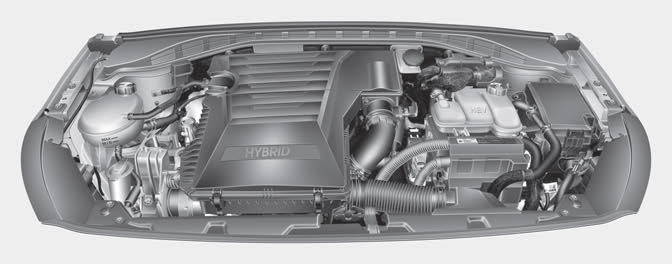
1. Engine oil filler cap
2. Engine oil dipstick
3. Engine coolant cap
4. Engine coolant reservoir
5. Inverter coolant reservoir
Copyright © 2025 www.hioniqae.com

